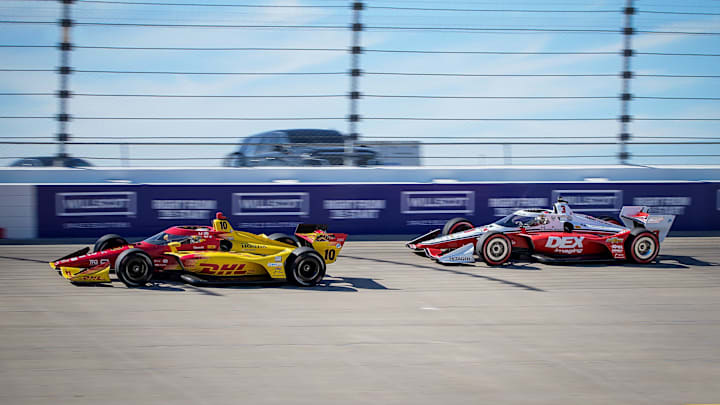While the IndyCar championship itself was locked up several weeks ago, with Alex Palou becoming the first to clinch the title with two races to go since 2002 and winning it for the third year in a row and fourth time in five years, the IndyCar oval championship, as under-the-radar as it flew, was extremely tight heading into the season finale at Nashville Superspeedway.
Palou led Arrow McLaren's Pato O'Ward by 13 points heading into Sunday's 225-lap race around the four-turn, 1.333-mile (2.198-kilometer) Lebanon, Tennessee oval. O'Ward appeared to be on his way to victory from pole, likely clinching his third career oval title in the process, but a late tire failure handed the crown to Palou.
However, make no mistake about it; Palou earned it.
Palou entered the year with zero career oval wins, and after having been faced with all kinds of questions about why he couldn't win on ovals and why he was 0-for-27 on ovals, despite his long list of runner-up finishes, podium finishes, top five finishes, and an exceptional average finish in oval races, he finally silenced his doubters.
He not only won the Indy 500, but he won at Iowa Speedway, where Chip Ganassi Racing hadn't won since 2010. He added two runner-up finishes at the Milwaukee Mile and Nashville Superspeedway, arguably his two worst tracks from last year, and also had finishes of fifth at Iowa Speedway and eighth at World Wide Technology Raceway at Gateway.
All of that is good for two wins, four podium finishes, and an average finish of 3.17 on tracks with exclusively left turns, tracks where the 28-year-old Spaniard was not supposed to be good.
What's interesting about this is the fact that IndyCar fans should have seen this coming, and we don't mean because of Palou's past success on ovals, success that was about as good as it gets without having actually scored a win.
We mean because of the recent history of the IndyCar oval championship.
The two newest oval champions coming into the year were O'Ward and Scott McLaughlin. O'Ward won it in 2021 and 2022, while McLaughlin won it in 2024 (after Josef Newgarden won it for a second time in 2023).
O'Ward entered 2021 with zero career oval wins. McLaughlin entered 2024 with zero career oval wins. Palou, of course, had the same tally entering 2025.
Since IndyCar began recognizing individual discipline champions in 2010, the series had not seen a driver lead the standings for ovals and for road and street courses in the same season until Palou this year.
Palou won the overall championship by 196 points over O'Ward, the road and street course championship by 145 points over Arrow McLaren's Christian Lundgaard, and the oval championship by 44 points over O'Ward.
In doing so, he became the first driver to win the season opener, win the Indy 500, and never relinquish the points lead since Johnny Rutherford in 1980.
You have to go back to Saturday, June 22, 2024 to find the most recent day on which Palou was not the IndyCar points leader.
Though he may not have reached the single-season wins record of 10, you could make a legitimate case that he just had the greatest season of all-time, especially considering the fact that the modern era of the spec series has largely been praised for its parity.
The 2026 IndyCar season is scheduled to get underway on Sunday, March 1 on the streets of St. Petersburg, where Palou earned the first of his eight wins in 2025. Live coverage is set to be provided by Fox.
